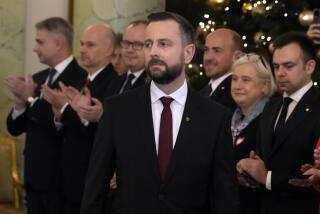Polish Premier Claims Solidarity Ties to KGB Spy
- Share via
WARSAW — Polish Prime Minister Jozef Oleksy, who resigned this week over allegations that he spied for Moscow, said Friday that his longtime KGB friend in Warsaw had similar relationships with high-level officials from the Solidarity labor movement.
Oleksy said there was no difference between his relations with Vladimir Alganov--which he asserts were of a social nature only and without knowledge that Alganov was a Russian spy--and those Alganov had with “well-known” Solidarity activists and political leaders.
“Alganov has a list of people--quite well-known people, and he has said that in Moscow--with whom he had contacts no worse than with me,” Oleksy said. “He was a guest at a Solidarity convention, and he established many contacts there.”
The prime minister’s assertion, made during an interview with The Times, was condemned as an act of political desperation by Lech Walesa, the former Polish president who led the Solidarity trade union until 1990.
“I think the prime minister is defending himself by attacking others,” said Walesa, who added that he never met Alganov. “Where is this going to lead us? Probably to court. I thought he was a more serious man, but he is not.”
Oleksy’s allegation widens the scope of an already sensational spy scandal, which has thrust Poland into its most serious political crisis since the fall of communism and has raised new fears about Russian influence over political life here.
Oleksy, a former Communist government official who became Poland’s first ex-Communist prime minister last March, has acknowledged socializing with Alganov, as well as another Russian agent, but says he did not know they were spies until after they left Poland.
*
He said Friday that he was guilty of “improprieties in my behavior” but not espionage.
“From close acquaintance to spying is a very long distance,” he said.
The Polish military prosecutor opened an investigation Wednesday into allegations last month by outgoing Interior Minister Andrzej Milczanowski that Oleksy knowingly passed state secrets to Alganov and Grigory Yakimishin, a spy for the Foreign Intelligence Service, a Russian successor to the KGB.
Milczanowski alleges that the contacts began in 1982 and ended last year.
By drawing a link between the Solidarity leadership and Alganov, a top official at the Soviet Embassy in Warsaw until 1992, Oleksy is trying to bolster his contention that he was duped by a skillful spy--someone who he asserts also exploited social contacts with the country’s leading anti-Communists.
“This is my Golgotha,” Oleksy said, referring to the hill where Jesus Christ was crucified. “I didn’t deserve it.”
Jacek Kuron, a well-known opposition leader under communism who was imprisoned for his anti-Communist activities, characterized Oleksy’s comments as “unacceptable and scandalous.”
“This statement goes beyond the competence of a politician,” said Kuron, who has criticized Polish politicians and the media for passing judgment on Oleksy before the case against him is investigated by the country’s military prosecutor.
“The prime minister can speak only about his own contacts,” Kuron said. “He is a victim of such [dirty] methods, but now he enters the same kind of a game. I think this is a scandal.”
Oleksy, who remains in office until his successor is named by President Aleksander Kwasniewski, offered no evidence to substantiate his claim. But he said he suspects that Polish intelligence services also know about Alganov’s association with Solidarity but have chosen to remain silent for political reasons.
Aleksandra Jakubowska, spokeswoman for Poland’s ruling coalition government, said Oleksy’s information came, at least in part, from unpublished conversations Alganov and his associates had with a Polish reporter in Moscow.
The reporter, Waldemar Gontarski, said he received a list of Alganov’s Polish acquaintances--including names of Solidarity officials--from associates of the KGB spy, but Alganov refused to confirm or deny the names until the Oleksy investigation is completed.
Efforts to reach Alganov were unsuccessful.
Milczanowski, the former interior minister who disclosed the allegations against Oleksy, would not comment on whether Solidarity officials had dealings with Alganov, citing government secrecy restrictions.
But he said evidence that Oleksy spied for Moscow goes beyond the issue of his social ties with Alganov and Yakimishin. If Oleksy has similar evidence against Solidarity leaders, Milczanowski said, “let him present this list then.”
*
“It can be said very clearly: Polish secret services never charged anyone with just having social contacts,” he said. “If there was only a problem of social contacts, this case wouldn’t even come up.”
Oleksy claims Milczanowski has been blinded by his “fanatic support” for Walesa. Milczanowski, a former Solidarity activist, was appointed to his Interior Ministry post by Walesa.
Milczanowski “dealt only with the prime minister from the left. And why?” Oleksy asked. “Because it fit Walesa’s losing camp, because it fit the spread of anti-Communist feelings and anti-Russian feelings. . . . This is political revenge.”
Oleksy, who has often been criticized for advocating policies too friendly to Moscow, said he also felt betrayed by Alganov and the country he so often defended.
“It turned out that he was an agent, he started a file on me, he gave me a code name. This is something really horrible,” Oleksy said. “I cannot forgive the Russians because this is their agent providing this information. Let them bring order to their agents.”
More to Read
Sign up for Essential California
The most important California stories and recommendations in your inbox every morning.
You may occasionally receive promotional content from the Los Angeles Times.













